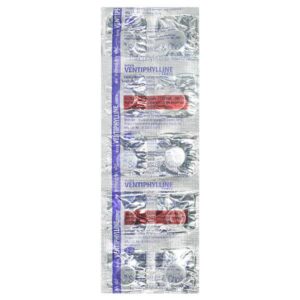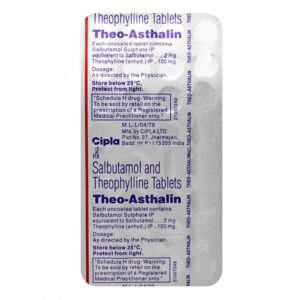SALBUTAMOL + THEOPHYLLINE
Salbutamol: Salbutamol, also known as albuterol in the United States, is a bronchodilator medication commonly used in the treatment of asthma and chronic obstructive pulmonary disease (COPD). It belongs to a class of drugs called beta-agonists and is available in various forms, including inhalers, tablets, and syrup.
The main therapeutic use of salbutamol is to relieve and prevent bronchospasm, which is the tightening and narrowing of the airways in the lungs. It does so by stimulating the beta-2 adrenergic receptors in the smooth muscles of the airways, causing them to relax and allowing for easier breathing. This bronchodilation effect helps in managing asthma symptoms such as wheezing, shortness of breath, and coughing.
The dose and administration of salbutamol can vary depending on the formulation and the individual’s condition. Inhaled forms are typically used for quick relief during acute attacks, while oral tablets or syrup are used for long-term control. The usual recommended dose for inhalers is 1-2 inhalations every 4-6 hours as needed, up to a maximum of 8 inhalations per day. For tablets or syrup, the typical starting dose is 2-4 mg three to four times daily, with a maximum dose of 32 mg per day.
Like any medication, salbutamol can cause side effects, although not everyone experiences them. Common side effects may include tremors, headache, palpitations, muscle cramps, restlessness, dizziness, and increased heart rate. These effects are usually mild and transient. In some cases, salbutamol can also lead to more severe side effects such as chest pain, arrhythmias, allergic reactions, and paradoxical bronchospasm (worsening of breathing difficulties). If any of these serious side effects occur, immediate medical attention should be sought.
It is important to note that salbutamol is not a cure for asthma or COPD but rather a short-term reliever and preventive treatment. It should be used under the guidance of a healthcare professional, and patients should always follow the prescribed dose and instructions. If symptoms worsen or do not improve despite medication use, medical advice should be sought.
Theophylline: Theophylline is a medication commonly used for the treatment of asthma and chronic obstructive pulmonary disease (COPD). It belongs to a class of drugs called methylxanthines. Theophylline works by relaxing the smooth muscles in the airways, opening them up and improving airflow.
Theophylline is available in various formulations, including tablets, extended-release tablets, capsules, and a liquid form. The appropriate dose of Theophylline varies depending on the individual’s age, weight, and the severity of their condition. It is usually taken once or twice a day, with or without food. The dosage should be carefully adjusted and monitored to maintain therapeutic levels in the blood, as Theophylline has a narrow therapeutic range.
Like any medication, Theophylline can have side effects. Common side effects include nausea, vomiting, stomach pain, headache, irritability, rapid or irregular heartbeat, and restlessness. These side effects are usually mild and transient, but if they persist or worsen, medical attention should be sought.
In some cases, Theophylline can cause more serious side effects, such as seizures, worsening of pre-existing heart conditions, or allergic reactions. It may interact with other medications, such as certain antibiotics, antifungal drugs, heart medications, and some herbal supplements. Drinking alcohol or smoking may also affect the metabolism of Theophylline in the body and should be avoided.
A healthcare professional should carefully monitor Theophylline therapy to ensure the drug is effective and the blood levels are within the therapeutic range. Blood tests may be required periodically to measure the drug levels in the body and adjust the dose if necessary.
It is important to note that Theophylline may not be suitable for everyone. Individuals with certain medical conditions, such as peptic ulcers, seizures, arrhythmias, or liver disease, may need special precautions or alternative treatments. Therefore, it is essential to consult with a healthcare provider before starting or making any changes to Theophylline therapy.


